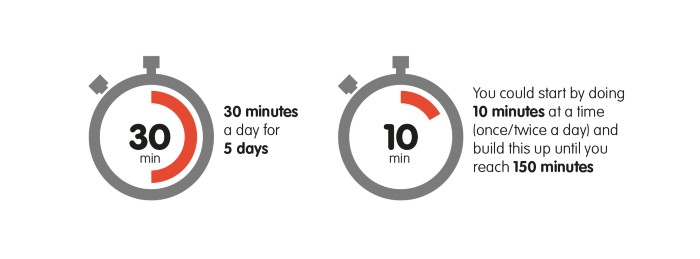About the NHS Targeted Lung Health Check (TLHC) Programme
Eating a balanced diet as well as being active will also help you to maintain a healthy eight. This is really important for your lung health as being overweight can make your breathing more difficult, making it harder for you to be active
Ways to improve your diet:
- Try to replace snacks with fruit and add vegetables to meals where possible. Aim to eat 5 portions a day.
- Choose low fat dairy products, but be careful as these can be high in sugars
- Try to replace eating red meat with more lean meats, including skinless chicken, turkey and fish. You can also have red meat with fat trimmed off, which is healthier
- Choose wholegrain carbohydrates where possible including wholemeal bread, rice and pasta
- Try to lower your salt intake by not adding salt at the table and reducing the amount you add to food when cooking so that you have no more than one teaspoon of salt a day
- Try to drink water regularly throughout the day. Remember that many drinks have sugar in them even when it says 'no added sugar'
- Try to avoid sugar and sugary foods.
You should also try and keep an eye on the amount of alcohol you drink.
Guidelines are now the same for men and women. Both are advised not to regularly drink more than 14 units of alcohol per week.
It's important that you don't save up your units and have these all in one drinking session. Its best to spread this evenly across the week and have regular drink free days.
How do I know if I'm a healthy weight?
To check your body weight you can use body mass index (BMI). Your BMI shows if you are a healthy weight for your height.
Liverpool services that can help:
Knowsley services that can help:
Content provided by One Liverpool, a partnership of local health and care organisations working together to support a healthier, happier and fairer Liverpool for all.
Published on Tue, 13 Jul 2021 12:29:39 GMT
Modified on Wed, 26 Oct 2022 12:07:06 GMT
Not only does it make your lungs feel stronger and help deliver oxygen better throughout your body, it can also help reduce your risk of long-term lung conditions such as Chronic Obstructive Pulmonary Disease (COPD).
Being active can help you control your weight also which can affect your lung function.
STEP 1: Get your heart rate up
STEP 2: Make your lungs work a bit harder
STEP 3: Improve your overall lung health
Increasing your activity levels can:
- give you more energy
- lower high blood pressure
- strengthen the muscles you use to breathe
- strengthen your heart and improve circulation
- reduce the risk of conditions like arthritis, diabetes, heart disease, stroke and cancer
- reduce your risk of falling by improving your strength and balance
- reduce stress levels and help to reduce anxiety and depression
Even if you feel unfit and often get breathless when being active now, it is all about finding what is right for you to begin with. Small amounts of activity such as taking the dog for a walk and gardening can still have a huge impact.
All you need to do is find the right level of physical activity for you to feel the positive effects throughout your life.
How active should I be?
For adults we recommend that you are physically active for 150 minutes (2 hours and 30 minutes) a week. You can break this down into:

150 minutes a week may seem too much if you are not used to being active. Just try your best to be as active as possible and slowly build this up at a steady pace.
Content provided by One Liverpool, a partnership of local health and care organisations working together to support a healthier, happier and fairer Liverpool for all.
Published on Tue, 13 Jul 2021 12:20:11 GMT
Modified on Mon, 04 Apr 2022 10:01:36 GMT
You can slow down the damage that smoking causes to your lungs and ease your symptoms.

Useful tips you can try:
- Think about why you smoke? Why do you want to give up? Write this down so you can remember why you are giving up
- Remove anything that reminds you of smoking such as ashtrays and lighters
- Call yourself a non-smoker, soon you will be!
- Get the support of friends and family by telling them you're dedicated to quitting
- Keep track of how much money you're saving and plan how you will spend it
- Prepare for possible withdrawal symptoms and how you will cope
- Remember cravings only last 2 to 3 minutes so distract yourself and it will be gone before you know it
- Don't let a slip up stop you. Just put it down to experience and start again
- Challenge yourself to quit by a certain date and stick to it
- Avoid other people smoking. This can be as bad as smoking yourself and will make it harder to quit.
Becoming smokefree is not easy, but there are lots of local services available to offer the right support that will help you to quit smoking, this time for good.
Even if you have not been successful before, it's important that you saw the need to try.
Remember, each quit attempt is a step further towards becoming smokefree.
What support is right for you?
There are many support options available with different choices working better for different people.
Nicotine Replacement Therapy
Nicotine replacement therapy (also know as 'NRT'), comes in all shapes and sizes and helps to reduce symptoms so you can give up smoking easily.
You can get patches, gum, nose and mouth sprays, all of which release nicotine into your bloodstream without you needing to smoke.
Other local support options include:
Content provided by One Liverpool, a partnership of local health and care organisations working together to support a healthier, happier and fairer Liverpool for all.
Published on Tue, 13 Jul 2021 16:18:34 GMT
Modified on Wed, 26 Oct 2022 12:06:15 GMT
Common symptoms you can look out for:
- Having a cough most of the time, that lasts for 3 weeks or more
- A change in a cough that you have had for a long time
- Weight loss
- Loss of appetite
- Wheezing
- Being more breathless than usual and increasing breathlessness when exercising and moving around
- Chest tightness
- An ache or pain in the chest or shoulder
- Frequent chest infections
- Coughing up blood
- Hoarseness
If you are worried about any of the symptoms above, see your GP as soon as possible.
Content provided by One Liverpool, a partnership of local health and care organisations working together to support a healthier, happier and fairer Liverpool for all.
Published on Wed, 14 Jul 2021 15:51:42 GMT
Modified on Wed, 26 Oct 2022 12:08:22 GMT
Content provided by One Liverpool, a partnership of local health and care organisations working together to support a healthier, happier and fairer Liverpool for all.
Published on Tue, 13 Jul 2021 11:48:12 GMT
Modified on Wed, 05 Jul 2023 10:04:08 GMT





















